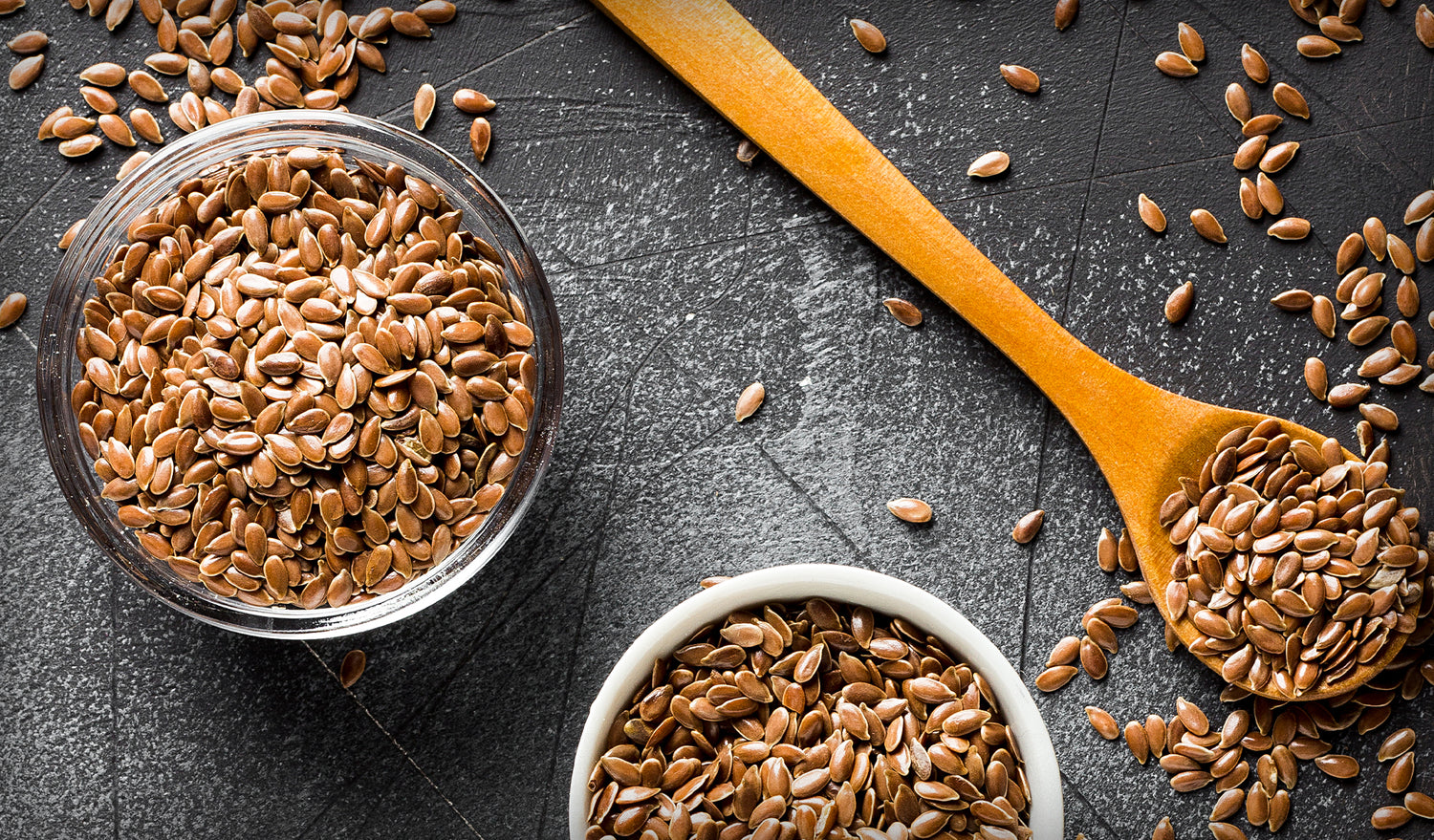RELAX...IT'S FLAX
Flax (Linum usitatissimum) is a plant native to the Mediterranean that has been used as a food item for well over 5000 years. Although whole flaxseeds contain a toxic glucoside, it is detoxified by heating.
Flaxseeds are shaped like sesame seeds but are slightly larger and have a hard shell that is smooth and shiny. Their color ranges from deep amber to reddish brown depending upon whether the flax is of the golden or brown variety. The flaxseeds flavor is warm and earthy with a subtly nutty edge. While whole flaxseeds feature a soft crunch, they are also not consumed hole but rather ground, since this allows for the enhancement of their nutrient absorption. Ground flaxseeds can have a relatively mealy texture with a potential hint of crunch depending upon how fine they are ground.
HISTORY
Flax has been grown since the beginnings of civilization, and people all over the world have celebrated its usefulness throughout the ages. Flaxseeds originated in Mesopotamia. Historians have documented its use as ancient records show that flax was cultivated in Babylon in about 3000 B.C.E. and burial chambers depict flax cultivation and clothing made from flax fibers. Around 650 B.C.E. Hippocrates wrote about using flax for the relief of abdominal pains. In the same era, Theophrastus recommended the use of flax mucilage as a cough remedy. In the eighth century C.E., Charlemagne considered flax so important for the health of his subjects that he passed laws and regulations requiring its consumption. After this, flaxseeds became widely appreciated throughout Europe.
It was not until the early colonists arrived in North America that flax was first planted in the United States. In the 17th century, flax was first introduced into and planted in Canada, the country that is currently the major producer of this extremely beneficial seed.
NUTRITIONAL HIGHLIGHTS
Flaxseeds are in excellent source of the omega-3 essential fatty acid alpha-linolenic acid (ALA), as well as vital estrogen‘s known as lignins. They are a very good source of dietary fiber, magnesium, potassium, and manganese. They are also a good source of the minerals phosphorus, iron, and copper.
HEALTH BENEFITS
The major health benefits of flaxseeds are derived from there alpha-linolenic acid and lignin content. Flaxseed oil contains nearly twice the level of omega-3 fatty acids as fish oil, although it contains the shorter chain alpha-linolenic acid rather than a longer-chain fats, such as eicosapentaenoic acid (EPA) and docosahexaenoic acid (DHA). Alpha-linolenic acid can be converted to these longer chain omega-3 fatty acids, but the conversion depends upon the presence and activity of an enzyme called delta-6-desaturase, which, in some individuals, is less available or less active than in others. In addition, delta-6-desaturase function is inhibited in those with diabetes and nutrient deficiency, and by the consumption of saturated fat and alcohol.
Although much of the benefit of ALA is via conversion to the longer chain omega-3 fatty acids, ALA has also shown benefits of its own, including reducing the risk of heart disease and cancer. In addition, flaxseeds and flaxseed oil are the most abundant sources of plant lignans. These components are fiber compounds that can bind to estrogen receptors and interfere with the cancer promoting effects of estrogen on breast tissue. Lignans also increase the production of a compound known as sex hormone-binding globulin, or SHBG. This protein regulates estrogen levels by escorting excess estrogen from the body.
Reducing estrogen reduces breast cancer risk. Ground flaxseeds have also been shown to be helpful in improving blood lipid profiles.
SELECTION & STORAGE
Flaxseeds can be purchased either whole or already ground. The two different forms offered distinct benefits. Although ground flaxseeds may be more convenient, whole flaxseeds have a longer shelf life.
Whole flaxseeds are generally available prepackaged, as well as in bulk. We recommend purchasing them in packaged form, preferably refrigerated. Just as with any other food that you may purchase in the bulk section, make sure that the bins are covered and that the store has good product turnover so as to ensure maximum freshness. Whether purchasing flaxseeds in bulk or pre-packaged, make sure that there is no evidence of moisture. If you purchase whole flaxseeds, store them in an airtight container in a dark dry and cool place where they will keep fresh for several months.
Ground flaxseeds are usually available both refrigerated and non-refrigerated. It is highly recommended to purchase ground flaxseeds that are in a vacuum sealed package or have been refrigerated since once flaxseeds are ground, they are much more prone to oxidation and spoilage. Whether you purchased ground flaxseeds or grind them at home, it is important to keep them in a tightly sealed container in the refrigerator or freezer to prevent them from becoming rancid. Ground flaxseeds stored in the refrigerator in this manner will keep fresh for six months; in the freezer, for one year.
Flaxseed oil should definitely be cold pressed and purchased in opaque bottles that have been kept refrigerated. Flaxseed oil should have a sweet, nutty flavor. You should never use a flaxseed oil in cooking, but you can add it to foods after they have been cooked.
PREP TIPS
Ground flaxseeds in a coffee or seed grinder in order to enhance their digestibility and therefore their nutritional value. If you are adding ground flaxseeds to a cooked cereal or a green dish, do so at the end of cooking since the soluble fiber in the flaxseeds can thicken liquids if left too long. A typical serving size for ground flaxseeds is one or 2 tablespoons daily.
Try ground flaxseed sprinkled on vegetables or use flaxseed oil in your dressing recipes...
SAFETY
Flaxseeds do contain moderate amounts of oxalate. Individuals with a history of oxalate containing kidney stones should avoid over consuming flaxseeds.
RESOURCES
- The Encyclopedia of Healing Foods by Dr. Michael Murray, ND



